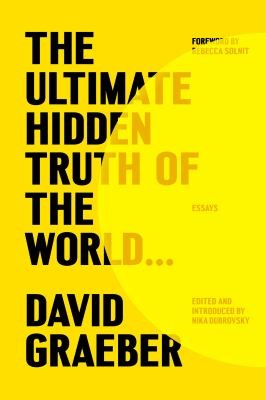Points out the obvious that no one is noticing
5 stars
( em português: sol2070.in/2025/04/livro-david-graeber-ultimate-hidden-truth/ )
”The Ultimate Hidden Truth of the World...” (2024, 384 pgs) brings together articles and interviews by anarchist anthropologist David Graeber.
Anyone who enjoys his thought-provoking work will be delighted. With his characteristic perspicacity, which points out the obvious that no one is noticing, he touches on diverse topics — such as the economy, inequality, the cultural landscape, altruism, the politics of hatred, etc — in which each article could be the starting point to an entire book.
On the other hand, some articles condense central themes from his most influential works, such as “The Dawn of Everything”, “Debt” and “Bullshit Jobs”. Some were the germs that gave rise to the books; others are developments with recapitulation.
The title of the collection, “The Ultimate Hidden Truth of the World”, refers to the theme that runs through some of the articles and is also at the heart …
( em português: sol2070.in/2025/04/livro-david-graeber-ultimate-hidden-truth/ )
”The Ultimate Hidden Truth of the World...” (2024, 384 pgs) brings together articles and interviews by anarchist anthropologist David Graeber.
Anyone who enjoys his thought-provoking work will be delighted. With his characteristic perspicacity, which points out the obvious that no one is noticing, he touches on diverse topics — such as the economy, inequality, the cultural landscape, altruism, the politics of hatred, etc — in which each article could be the starting point to an entire book.
On the other hand, some articles condense central themes from his most influential works, such as “The Dawn of Everything”, “Debt” and “Bullshit Jobs”. Some were the germs that gave rise to the books; others are developments with recapitulation.
The title of the collection, “The Ultimate Hidden Truth of the World”, refers to the theme that runs through some of the articles and is also at the heart of “The Dawn of Everything”. This “ultimate hidden truth” is that we are free to build better societies and lives. There is no compulsory socio-political-economic direction that is not cultural, that was not created by humans. We are not bound by any oppressive fixed destiny. In the same way that the evils that plague humanity, such as inequality, were manufactured, we can manufacture and adapt beneficial and liberating cultures, at the individual and collective levels.
The following is a translation of one of the best articles in the book, in which Graeber speculates — among other topics, such as natural theories about selfishness and altruism, and even the “hard problem” of consciousness — about panpsychism, the idea that all things have at least some cognition. This doesn't mean that every material particle has a soul or intelligence, but rather that, for example, for a molecule to be able to self-organize in the way it does, it needs to “sense” its exterior in some way, and this amounts to a minimum level of cognition.
He goes on to argue that a sense of play, of playing and having fun, being an inseparable expression of a fundamental freedom, is a central aspect of consciousness or subjectivity. And if it is in everything, it would also be in the essence of all reality. Of course, his liberating and anarchically inquisitive spirit could not be missing from this investigation.
The title (“What’s the Point If We Can’t Have Fun?“) seems to refer to the famous phrase by anarchist feminist Emma Goldman: “If I can't dance, it's not my revolution.”

